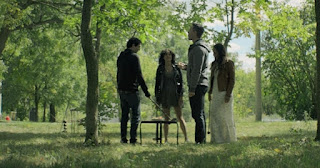Originally published on Set The Tape
Creating stories about pandemics feels like its a risky thing at the moment. We’re two years into the Covid-19 pandemic with no end in sight and thousands of people still dying, and it’s not exactly the kind of time where you’d want to sit down and relax with a film about a deadly virus. As such, the new movie Ashgrove seems to face a hard time in winning audiences over. But rather than focus on the grand scale of a global pandemic, it’s relying on personal drama and mystery to suck the audience in.
Ashgrove begins in some undefined near future, where humanity is facing a crisis. A virus has ripped through the population, already killing more than sixty percent of humanity. The virus bonds with water molecules, which leads to an awful predicament: drink too much water and the virus builds up in your system and kills you; drink too little and you die of dehydration. And even rationing water, drinking the absolute minimum won’t cut it, as the virus will still slowly build up inside you. Humanity is facing extinction in just a few short years unless something can be done.
Amanda Brugel (The Handmaid’s Tale, Kim’s Convenience) plays Jennifer, one of the best scientist in the world, and the woman who’s been labelled as humanity’s last hope for survival. When the film opens we see her crying in her bathroom, when sudden inspiration strikes and she rushes out of the house. In her car she phones her work colleagues, telling them to gather the team as she’s ‘figured it out’. Then the screen cuts to black and Jennifer wakes up a few days later in bed with no memory of the events. She’s suffered from a stress-induced blackout and amnesia. Her doctor has advised her that she has to take a few days off to recover, so she and her husband, Jason (Jonas Chernick – James Vs His Future Self) head off to their countryside farm for the weekend. However, Jennifer begins to feel like something is off when Jason starts acting strangely, and sneaking off for odd phone calls.
Ashgrove feels like an odd film at times. Despite being set during a deadly pandemic it never feels like there’s one going on. We get the lowdown on what’s happening at the start of the film thanks to a radio interview, but never see mass graves, overrun hospitals, or social upheaval as you’d normally get in a story like this; especially if sixty percent of the population were dead. Instead, the film feels more like a drama piece, where the characters and their personal relationships are the focus.
Whilst this isn’t a bad approach in itself, is it enough to keep the film interesting? Not entirely, no. There were times where I found events to be a little slow for my liking, and the conversations and arguments between Jennifer and Jason felt a little contrived in order to manufacture drama just for something to be happening. For example, Jason complains about feeling like he’s on his own a lot, because his wife is off trying to stop the extinction of humanity. Okay, sure, you’re lonely Jason, but do you want to keep living? These kind of arguments probably do happen to folks who work on cures for deadly diseases in the real world, but it just felt a bit forced here. Luckily, there is something else to keep you interested if this kind of drama doesn’t do it for you.
Shortly after arriving at their countryside retreat we see Jason consulting a list on his phone. At first it looks like it’s just a list of chores for getting the house up and running for their stay, such as which of them will sweep the decking. But the un-ticked parts of the list includes ‘ukulele fight’, and sure enough, soon after the two of them argue over Jason’s new musical instrument. From here you start to notice him watching her from windows, forcing certain choices, and making strange phone calls. This odd element definitely injects a little something special into the movie, and whether or not you end up satisfied when you get all the answers, I think you’ll definitely find the journey to getting them, and the theories you’ll make along the way, engaging.
Ashgrove isn’t the perfect film by a long stretch. The script falls a bit flat in places, as several scenes allowed the actors to improvise lines; the lack of real focus on the pandemic and the upcoming extinction of humanity made it feel like the entire point of the plot was a background element; and the film does rely on a side character having to literally sit folks down and explain everything in one big scene in order for stuff to start making sense come the conclusion.
Despite these issues I still had a good time with Ashgrove. The performances were decent, the locations were nice, and the story was interesting enough to keep my attention for an hour and a half. If you’re looking for something a little different from other pandemic style movies, this is one that is worth considering.


.jpg)
No comments:
Post a Comment